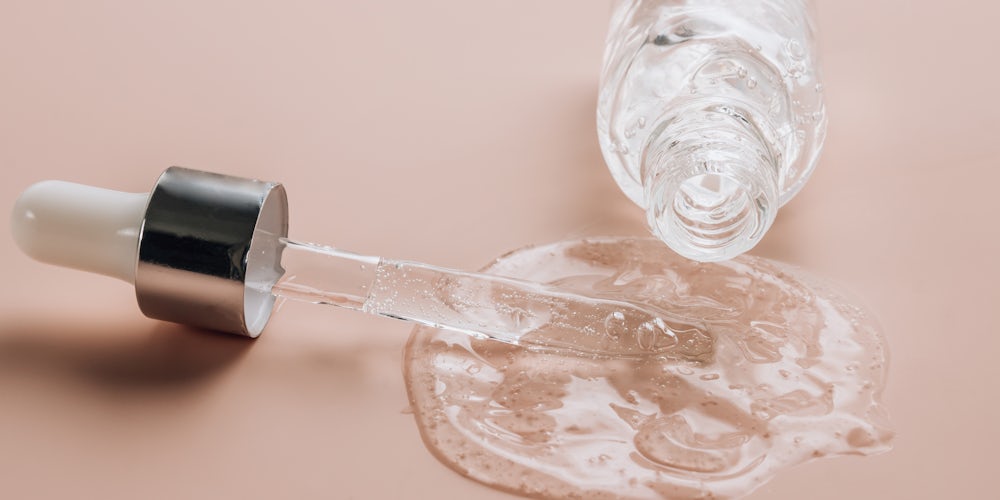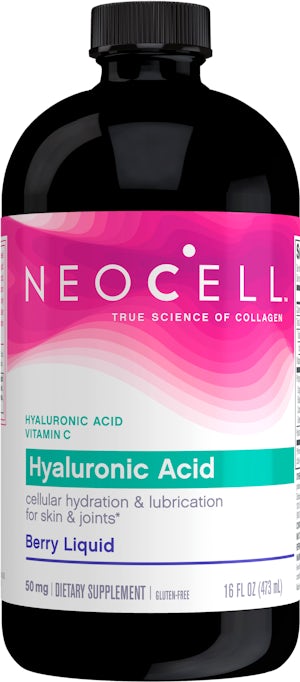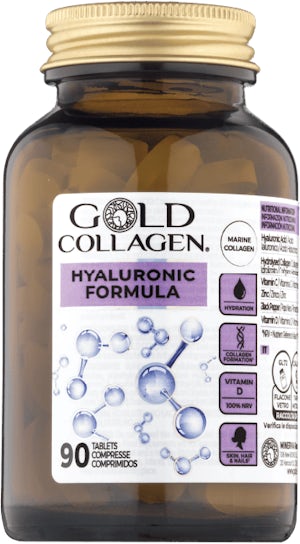Hyaluronic acid
Hyaluronic acid (HA) is a naturally occurring substance found throughout the body, particularly in the skin, eyes, and joints. This remarkable molecule is renowned for its exceptional ability to retain moisture, holding up to 1,000 times its weight in water. HA plays a crucial role in maintaining skin hydration, joint lubrication, and wound healing. As people age, the body's natural production of it decreases, leading to various signs of ageing. Supplementation with hyaluronic acid has gained popularity in recent years, with research suggesting potential benefits for skin health, joint function, and overall well-being.
Key Facts
- Hyaluronic acid is a glycosaminoglycan, a type of complex sugar molecule.
- The human body contains approximately 15 grams of hyaluronic acid, with one-third of it being degraded and synthesised daily.
- HA is found in high concentrations in the skin, accounting for 50% of the body's total hyaluronic acid content.
- The molecular weight of HA can vary significantly, ranging from 5,000 to 20,000,000 daltons.
- Hyaluronic acid production in the body decreases with age, contributing to skin ageing and joint issues.
- HA has been shown to have anti-inflammatory properties and may help in tissue regeneration.
What are the primary food sources of hyaluronic acid?
While hyaluronic acid is not commonly found in high concentrations in foods, some sources include bone broth, organ meats (particularly chicken combs), and certain root vegetables like sweet potatoes and tubers. Additionally, foods rich in vitamin C and amino acids may support the body's natural production of HA.
How can I supplement hyaluronic acid?
Hyaluronic acid can be supplemented through oral capsules, topical serums, creams, or injections administered by healthcare professionals. Oral supplements typically range from 100-200 mg per day, while topical products contain varying concentrations of HA for skin application.
Medino recommends:
What are the main symptoms of hyaluronic acid deficiency?
While not technically a deficiency, low levels of hyaluronic acid may manifest as dry, less elastic skin, fine lines and wrinkles, joint stiffness, and slower wound healing. These symptoms are often associated with the natural ageing process as HA production declines over time.
What does the research say about hyaluronic acid and its function in the body?
Research indicates that hyaluronic acid plays a vital role in maintaining skin hydration, joint lubrication, and tissue repair. Studies have shown that HA supplementation can improve skin moisture, reduce the appearance of wrinkles, and potentially alleviate joint pain in conditions such as osteoarthritis.
Are there any known side effects of hyaluronic acid?
Hyaluronic acid is generally considered safe for most people when used as directed. However, some individuals may experience mild side effects such as redness or itching at injection sites, or digestive discomfort with oral supplements. It's always best to consult a healthcare professional before starting any new supplement regimen.
What should you look for on the label when supplementing hyaluronic acid?
When choosing a hyaluronic acid supplement, look for products that specify the molecular weight of the HA, as different weights may have varying effects. Additionally, check for purity, dosage, and any additional ingredients that may enhance absorption or efficacy, such as vitamin C or collagen.

Can hyaluronic acid help with eye health?
Yes, hyaluronic acid can benefit eye health. It's a key component of the vitreous humour in the eye and is often used in eye drops to alleviate dry eye symptoms. HA's moisture-retaining properties can help lubricate the eye surface and promote healing after eye surgeries or injuries.
Is hyaluronic acid effective for joint pain?
Research suggests that hyaluronic acid can be effective for joint pain, particularly in osteoarthritis. It acts as a lubricant and shock absorber in the joints. Injections of HA into affected joints, known as viscosupplementation, have shown promise in reducing pain and improving joint function in some patients.
Can hyaluronic acid be used during pregnancy?
While topical use of hyaluronic acid is generally considered safe during pregnancy, it's always best to consult with a healthcare provider before using any new skincare products or supplements. Oral supplementation and injectable forms should be approached with caution and only under medical supervision during pregnancy.
Sources
- Cleveland Clinic – Hyaluronic Acid
- Examine – Hyaluronic Acid
- Frontiers in Bioengineering and Biotechnology – Hyaluronic Acid Overview
- Frontiers in Veterinary Science – Hyaluronic Acid Applications
- Harvard Health – The Hype on Hyaluronic Acid
- Healthline – Beauty and Skin Care Guide
- Medical News Today – Benefits of Hyaluronic Acid
- Victoria Health – Hyaluronic Acid Capsules
- WebMD – Benefits of Hyaluronic Acid





